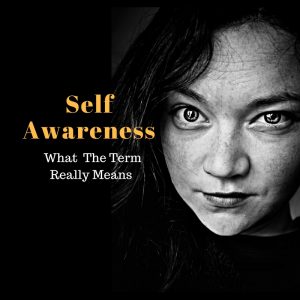What Is Self Awareness?
 I Goggled the term “Self Awareness” and got 300,000 search results. It’s a term that gets thrown around quite a bit. But, like many phrases that are tossed about in every day language, the actual meaning is lost on some. They may nod in agreement when they hear it, but do they really know what it means to be self-aware? Do you really know what it means?
I Goggled the term “Self Awareness” and got 300,000 search results. It’s a term that gets thrown around quite a bit. But, like many phrases that are tossed about in every day language, the actual meaning is lost on some. They may nod in agreement when they hear it, but do they really know what it means to be self-aware? Do you really know what it means?
According to all-knowing, all-seeing Wikipedia, “Self-awareness is the capacity for introspection and the ability to recognize one’s self as an individual separate from the environment and other individuals.”
Oxford dictionary says it is, “conscious knowledge of one’s own character, feelings, motives, and desires…” That’s a good definition for the purposes of this article. But my favorite search result was the Amazon ad that appeared which read, in-part, “Low Prices on Self-awareness Free Shipping on Qualified Orders.” Who knew?
Self awareness is tricky. It requires the ability to know where the line is drawn between our real and our ego-driven selves. A lot gets in the way of truly understanding one’s true self. Our emotions, our tolerance levels, experiences we can and can’t recall, messages we take in consciously and unconsciously.
The number of things that influence us is staggering and growing. A story about “Sonic Seasoning” on American Public Radio’s Marketplace revealed that music playing in the background can influence how we experience the taste of our food. Food can taste sweeter if we’re listening to high-pitched sounds like wind chimes. If that’s possible, imagine how many other ways we unconsciously react to the world around us.
We could never completely master self-awareness. That would be like counting every drop of water in the ocean. But the more we tune in to our triggers and reactions, the better equipped we are to consciously choose the outcomes in our lives. How can we peel away the layers that hide our true selves? One place to start is with behaviors that signal a lack of self-awareness.
Often times, we exhibit behaviors that reveal how un-self-aware we actually are. A 2013 Inc.com article suggests that when we resort to these 7 things, we’re showing the world that we’re not as self-aware as we may think.
- Bullying is a sign that we’re feeling threatened and protecting something we don’t want others to see.
- Defensiveness is an attempt to resist genuine, objective feedback.
- Controlling and micro-managing is a refusal to see the big picture because of an underlying, unaddressed issue.
- Passive aggressiveness is a way to avoid confronting others or dealing with something that makes us feel vulnerable.
- Behavior changes signal that we’re bothered by something that is hiding in our subconscious.
- When we’re boastful and grandiose, it could really mean we’re in over your heads.
- Making excuses is a way to avoid or deflect negative attention.
The truth is that we are all guilty of these behaviors at one time or another. The secret is knowing that, exploring why we’re reacting as we are and redirecting our behavior to achieve the best results.
If you lead people, being self-aware means you understand how your attitude and behavior impacts others — which is critically important. Your ability to influence them relies heavily on knowing how to manage the unique chemistry between you and your team. In what may feel counter-intuitive to our traditional view of authority, self-aware people are humble. Humility is a powerful tool when managing others.
Humble people comfortably accept critical feedback and are willing to let others shine. Why? Because they’re not threatened by others. Their focus tends to be on the greater good. Self-awareness reduces the threat from outside influences that can negatively affect our behavior. It opens up space for the hidden forces that trigger defensiveness and self-doubt to rise to the surface where we can address them constructively.
Are you self-aware? If you want to find out, take this one line self-awareness test. Gauging and improving your own self-awareness may be easier than you think.

